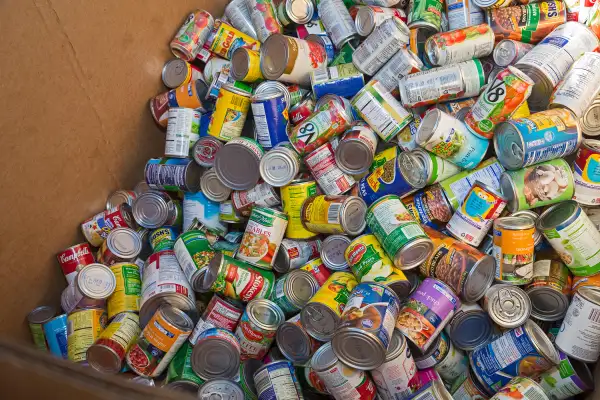Is It Better to Donate Food or Money Around the Holidays?

The abundance of the holiday season — overflowing tables, piles of gifts — prompts us to remember those less fortunate. It's the time of year when Salvation Army red kettles appear in public places, grocery stores set up giant bins for donating canned goods, and soup kitchens do turkey drives. The profusion of options raises the question: If you only have so much to give (and who doesn't?), is it better to give food to the hungry or money to the charities that feed the needy?
Charities that fight hunger are unanimous in their preference: They'll take money, please.
"If you’re looking to make the biggest impact with a donation, the best bet is to write a check," says Ashley McCumber, CEO of Meals on Wheels of San Francisco.
"We buy thousands of pounds of product at a time, as well as receive discounts due to our nonprofit status," says Charles Sommer, director of programs at St. Anthony’s in San Francisco. "We can make a dollar go much further than an individual would be able to at a grocery store," he says, because they're able to buy wholesale or in bulk.
"The charity’s team knows the specific needs of the community season by season," says Eileen Heisman, CEO of the National Philanthropic Trust. "Many charities are overwhelmed with some items and desperately need others. Baby food may be critically needed, nutritional shakes for seniors may be in short supply, but they likely have shelves of boxed stuffing and canned corn," she says. When you write a check, you help them fill those gaps.
Giving food does have value in some circumstances, says Feeding America spokesman Ross Fraser. For one thing, it's a great way to get kids involved and engaged in helping those less fortunate. Even young children can grasp the idea of giving, say, a jar of peanut butter to help feed someone who's hungry. Food drives give organizations like scout troops and youth groups a tangible sense of their contributions. And charities are quick to say that food is still a welcome donation, even if a monetary gift gives them greater flexibility.
If you are going to donate food, there are certain items that hunger prevention charities can almost always use, Fraser says. "The things that are most useful are going to be protein products — peanut butter, canned meat, shelf-stable milk, tuna fish." These foods can be too expensive for lower-income people, he says, so they often visit a food pantry to make up the shortfall. Fraser also says it's important to make sure you're giving healthy food. Feeding America found that one-third of households receiving food assistance have a family member with diabetes, and more than half have a member with hypertension. Choose fruit packed in light syrup rather than heavy, tuna in water over oil, and low-sodium or sodium-free veggies.
Finally, keep in mind that there might be a tax benefit if you donate a monetary gift rather than food. "Gifts can only be deducted from your taxes when made to qualified charities," says Joe Buhrmann, manager of financial security for Country Financial. "For gifts of money, you must have a bank record or a written statement from the charity to deduct the gift from your tax return." (Check out these tips for tax-smart giving.)
Read Next: The Smarter Way to Give to Charity
